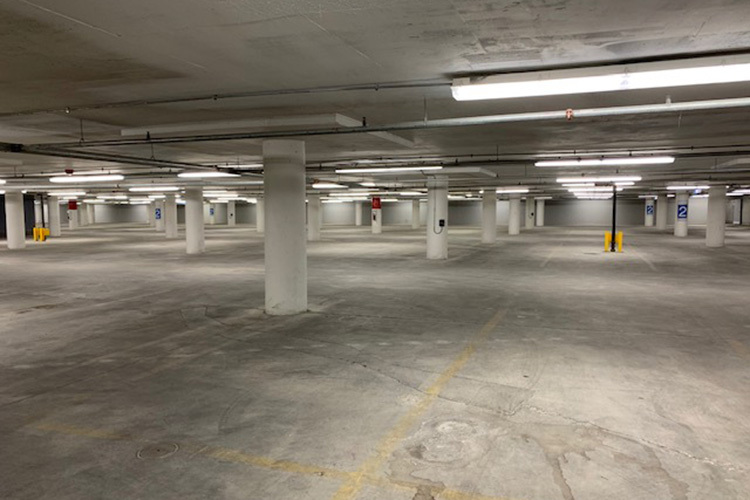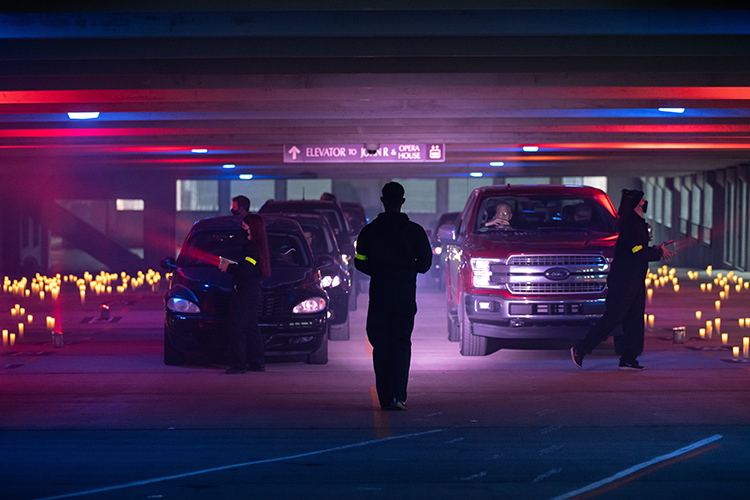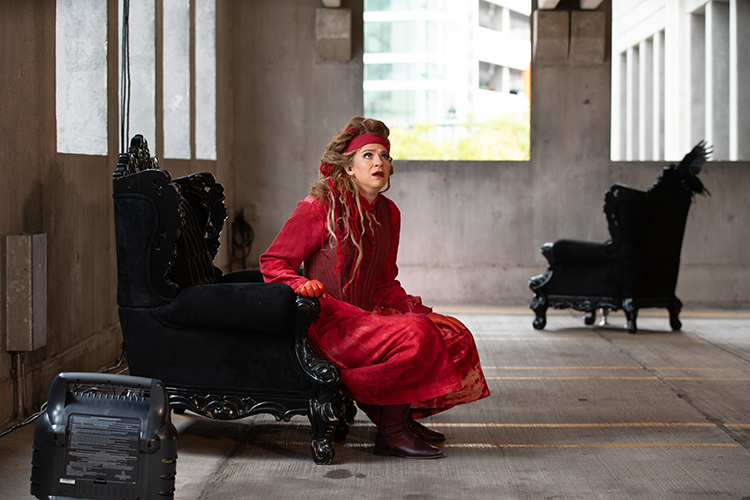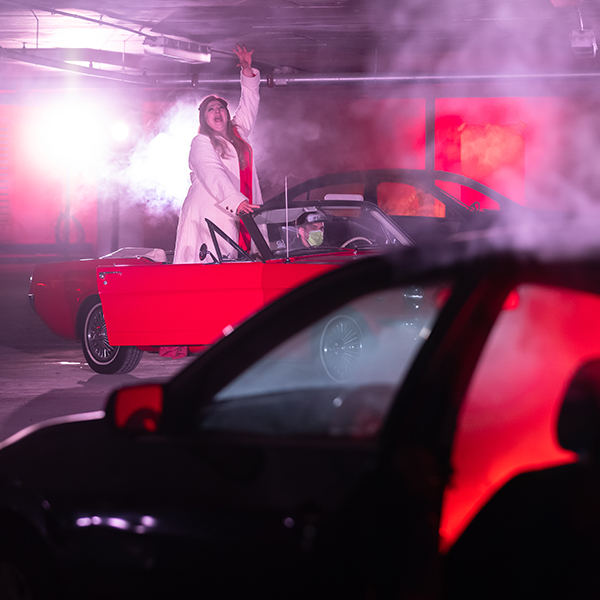April 20, 2021
Wait…this opera’s in a parking garage?
Thanks to the brilliant mind of “opera’s disrupter in residence” (New York Times), Yuval Sharon, Lyric Opera of Chicago will present a radical reimagining of Götterdämmerung, the final chapter of Wagner’s Ring cycle with a sold-out run of Twilight: Gods — in Millennium Garages - Millennium Lakeside Parking Garage in late April and early May. Say what? Michael Smallwood, Lyric’s technical director and VP, and Jackie Kane, Millennium Garages’ director of sales and marketing, are here to answer your questions.
Why Millennium Garages?
Taking a giant step back for additional context — Yuval Sharon was brought on as Lyric's creative catalyst shortly after the canellation of the Ring cycle to help reimagine Lyric programming. Through a partnership between Michigan Opera Theatre and Lyric, Sharon's innovative idea to present an opera in a parking garage began to look like it could really work. Once Sharon and Anthony Freud, Lyric’s general director, president & CEO, decided to present Twilight: Gods in Chicago (after its premiere in Detroit), the first big question was, “Where?” “We started conversations with the City of Chicago and they brought up to Millennium Garages,” Smallwood recalls. Originally, the plan was to set up this unconventional opera experience in a multistory outdoor garage, similar to the one used in Michigan Opera Theatre’s production. Noise from the CTA elevated trains near most of the city’s major outdoor parking garages nixed that thought and led the team to go underground. “We loved the option because Millennium Garages are massive, the community knows their name, and we were excited to bring recognition to the newer Lakeside Garage,” Smallwood adds.
“When Lyric reached out to us presenting the idea, we were thrilled to play a role in bringing music back into people’s lives,” says Kane. “We have been looking for ways to utilize our garages for events other than parking, especially in this COVID time, and this was the perfect indoor event to make it happen and show the city what’s possible.” Kane notes that Millennium Garages have been used for movie filming, and that they envision using it for a variety of non-parking activities in the future — anything from car shows to winter farmers' markets. “Not everyone realizes the Millennium Garages actually consist of four different garages: Millennium Lakeside, Millennium Park, Grant Park North, and Grant Park South. Our Lakeside Garage is the biggest of the four. It has a great location under Maggie Daley Park and just off Lake Shore Drive, and it’s quiet. It was the perfect match.”
Fun fact: The Millennium Lakeside Parking Garage could hold the entire Aon Center building if it was laid on its side! That’s plenty of room for a drive-through opera.

A corner of the 13 acres of Millennium Lakeside Parking Garage.
Logistically, how do you stage an opera in a parking garage?
Once the location was set, the next question centered around logistics. What does an opera in a parking garage look like? Lyric decided to embrace the Millennium Garages' aesthetic in creating the design for the opera production, integrating the garage into the storytelling. “This drive-through opera is really taking audiences on a journey,” says Smallwood. “We’ll add theater lights to illuminate the cars’ paths and of course we’ll add props and sets, but the garage’s fluorescent lighting and white cement walls add to the general look of the show.”
Lyric is working with Sharon and PXT Studios to design the production, testing the path that the cars will take in a “car-eography” rehearsal earlier this year. A singer and cellist were also brought to the garage in October 2020 to test the musical acoustics for voice and instrument. The audience’s journey has been central to planning this production. “We’re thinking of every possible issue at every possible turn that someone might experience in their car, giving us the idea to put lights on direction signs, have backup signs to remind audiences to change radio stations, using safety wands for staff to guide cars, and more,” says Smallwood.
How will Lyric’s Chicago production compare with Michigan Opera Theatre’s production?
For the premiere of Twilight: Gods last October, MOT used its own seven-level above-ground garage (with an open-air rooftop level where the finale was set), adjacent to the 99-year-old opera house. Lyric’s production will take place across the Loop from our 92-year-old opera house, set in a 13-acre portion of the vast underground Millennium Garages complex, all on one level. In preparing for the Chicago performances, Lyric has benefited greatly by being able to consult with partner Michigan Opera Theatre on what went well, what could be improved, and what can be tweaked to make the production unique to Chicago. The premiere featured narration written and performed by Detroit interdisciplinary artist Marcia Music; Lyric’s production will feature narration written and performed by Chicago interdisciplinary artist avery r. young. The principal singing artists who created their roles in Detroit will reprise those roles in Chicago, except for the Rhinemaidens, who will be portrayed by current ensemble members of The Patrick G. and Shirley W. Ryan Opera Center.

Directing cars through Michigan Opera Theatre's production of Twilight: Gods.
What is the ventilation system like in the garage for the performers?
The safety and comfort of the artists involved in Twilight: Gods are a top priority for Lyric, which is another reason why Millennium Garages was a perfect venue fit. “Millennium Garages uses an air intake and outake system of venting fans that are controlled with sensors around the garage that detect car fumes,” says Smallwood. “If fumes get too high, the venting system cranks up.” Kane explains, “Our automatic ventilation system is normally measuring CO levels by sensors, but we also have full capability to operate the system manually per area of the garage, meaning we can ensure a safe environment for everyone involved in the production.”
How have some of the physical elements of the Ring been adapted to the garage setting?
One of the pleasures of taking in an opera performance is seeing how certain aspects are physicalized, whether traditionally or innovatively, or somewhere in between. Lyric’s technical staff is working hard with the Twilight: Gods creative team to freshly conjure anticipated iconic images for the unconventional environment of Millennium Lakeside Garage. In place of a flying four-legged Grane, Brünnhilde’s trusty steed, the daughter of Wotan will instead arrive in a red 1964 Mustang, though the original metal horses and red light sticks from Lyric’s recent Ring production will be incorporated into Twilight: Gods. Blue fabric will represent the Rhine River. “There are columns inside the garage that flank the driving path at times, which we plan to use to build out the scenes and help depict the journey toward the end of the world,” says Smallwood. Millennium Lakeside Garage will present a unique version of Valhalla at every turn.

Mezzo-soprano Catherine Martin portrays Waltraute in Lyric's production of Twilight: Gods, as she did with Michigan Opera Theatre.
What behind-the-scenes preparations were made in the garage to accommodate rehearsals and performances?
The Millennium Lakeside Parking Garage has served as home to two fleets of 600 overflow cars from nearby car dealerships, which had to be moved out of the Twilight: Gods production path. Parking tenants who often use the garage for car storage also needed to temporarily relocate their vehicles. “Before Lyric arrived, we did some general cleaning, pressure washing of the walls and floors, and light garage maintenance,” Kane notes. “We’re fortunate that the garage is as big as it is and that it isn’t as busy as our other nearby garages, so that we have plenty of room to accommodate all uses at once.”
Twilight: Gods
Twilight: Gods
Experience an original film that captures Lyric's sold-out Chicago premiere of Twilight: Gods, a reimagining of the final chapter of Wagner's epic Ring cycle.
Filmed during the live production at Millennium Park Lakeside Garage in Spring 2021, this unique, drive-through experience was conceived by director Yuval Sharon, who wrote the new English texts, and features poetic transitions written and performed by Chicago interdisciplinary artist avery r. young. Chicago filmmaker Raphael S. Nash has created this original new feature from the critically-acclaimed production and it showcases the performances, video work and installations brought to life by singers, instrumental groups, and actors.

